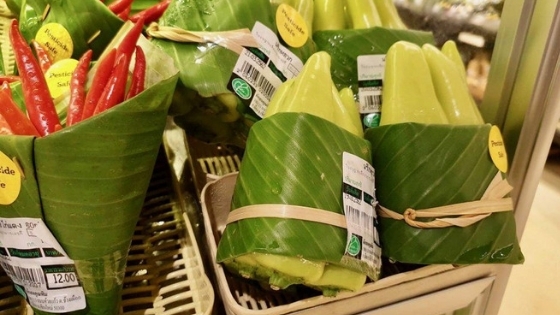

In today’s society we produce around 300 million tonnes of plastic each year, which is equivalent to the approximate weight of the whole human race.
Shocking isn’t it?
That’s why this month we are applauding and loving this incentive by a supermarket in Thailand. Although it isn’t the first-time banana leaves have been used for packaging food, Rimping supermarket in Chiangmai, is probably one of the first stores to use the versatile and natural product on such a large scale.
In response to the growing environmental risks posed by the increasing pace of plastic use, the supermarket has taken to using banana packaging to wrap up their fresh produce. From asparagus to sticky rice puddings and barbacoa tacos to fish, the supermarket is doing its bit helping to contribute to the reduction in the use and consumption of plastic.
With a sturdy structure, banana leaves make for a perfect form of packaging for fresh produce that sells quickly. Thailand is home to over 30 different varieties of bananas, with some leaves growing to as big as 9 foot in length! Therefore, there wouldn’t be a shortage of leaves to be able to introduce it as sustainable packaging on a large scale. Although in other countries this may not be the case, this type of forward thinking and investigation into sustainable, plastic free packaging is welcomed, especially as an example to encourage others.
Now that this eco-friendly thought train is on the roll, hopefully it won’t be long until more natural and environmentally friendly forms of packaging are introduced on a much larger scale, because if we don’t start the change now it is scary to imagine the world that our great-grandchildren could be born into due to our lackadaisical attitude towards the environment.
FAST FACT: The UN Environment reports that on a global scale, we use approximately five trillion single-use plastic bags every year, with half of the plastic produced designed for single use, estimating that if current trends continue, our oceans could contain more plastic than fish by 2050.